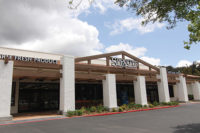
Schematic diagram of a secondary loop refrigeration system. (Courtesy of The Steve Perkins Agency.)
At the 26,000-square-foot Wal-Mart SuperCenter in Aurora, Colo., a propylene glycol-based heat transfer fluid is being used in a secondary-loop refrigeration system. The system, which cools the store’s meat, dairy, produce and other medium-temperature chilled food display cases, is designed to reduce the use of refrigerant gas and limit the potential for leaks into the environment.
The secondary-loop approach at the supermarket substitutes an abbreviated expansion loop (as compared to the more traditional direct expansion system) and a larger, low-pressure secondary loop filled with propylene glycol (Dowfrost™ from Dow Chemical Co.). The secondary coolant is a mixture of 35 percent inhibited propylene glycol-based heat transfer fluid and 65 percent deionized water.
The mixture is considered environmentally friendly, with no known impact on the ozone layer or contribution to global warming, the company says. The fluid is often used in systems where incidental contact with food, beverages, or contamination of potable or ground surface water could occur.
When properly installed and maintained, the inhibitors in the fluid are designed to help extend performance and eliminate corrosion problems. The fluid has low-pressure pumpability at temperatures down to 0°F.
In addition to cutting refrigerant emissions, Wal-Mart also wanted to improve display case cooling performance and protect food quality. The secondary-loop system in Aurora is providing even, constant refrigeration to chilled food display cases throughout the store at equivalent or lower operating energy expenses, according to Dow officials.
The primary refrigerant charge volume requirement is 65-85 percent lower, and the shorter direct-expansion loop helps reduce the number of the valves, fittings, and connections - potential leak sources.
According to Steve Perkins of The Steve Perkins Agency, a consultant on the Aurora project, “The No. 1 reason Wal-Mart chose the secondary-loop system is that it is environmentally friendly. The secondary loop operates at a much lower pressure using ABS plastic pipe instead of copper and generates fewer emissions.”
He also cited nationwide studies indicating that, on average, secondary-loop systems have almost 50 percent lower annual maintenance costs than more conventional systems.
According to Tom McNamara, sales manager for Univar USA, a Denver-based distributor of the fluid, shipment to the Aurora site followed a tightly managed procedure to ensure product purity. The fluid was stored in dedicated tanks and diluted with deionized water to the specified 35 percent concentration prior to delivery for installation.
“Great care is always taken to ensure that we do not introduce any chlorides into the mixture,” McNamara said.
“Our goal is to maintain product quality and make sure that the fluid inhibitors are not compromised, so the customer’s system remains intact without any corrosion for years to come.”
For more information, visit www.dowfrost.com.
Publication date:12/03/2007


